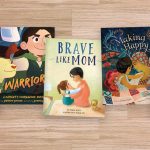
A new Carl Hiaasen novel for young readers has been a cause for celebration since his first book for kids—Hoot (Knopf Books for Young Readers, 2002)—was named a Newbery Honor winner. And Wrecker (Knopf Books for Young Readers, 2023), just published on September 26, is already demonstrating the reason for that excitement. It’s receiving an enthusiastic early welcome from reviewers and is likely to engender the same from readers as soon as they can get their hands on it, as it has many of the quintessential elements that make Hiaasen’s stories such fan favorites: wild adventure, intriguing mystery, a South Florida setting, environmental activism, and laugh-out-loud humor. But Hiaasen has also taken this opportunity to tackle other complex issues that today’s young readers are grappling with as well. In the case of Wrecker’s main character, that includes the racist roots of the community he calls home, his nontraditional family structure, and the impact of COVID on his world.
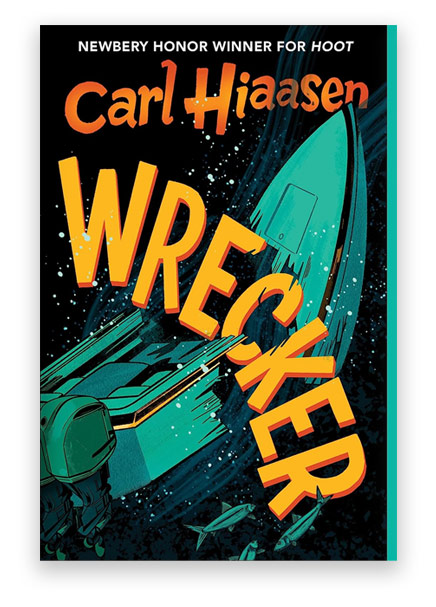
Here, Hiaasen talks with Lisa Bullard about his delight in creating characters who bravely make things happen, why he enjoys writing for kids, and the reason he’s compelled to keep focusing on the preservation of wild places.
Your last book for middle grade readers was Squirm (Knopf Books for Young Readers, 2018). What was it about this new character—Wrecker—and his story that inspired you to return to writing for kids?
I’ve always wanted to set a novel in Key West, which is the most colorful island in Florida. The history of the place is rich and dramatic, and I wanted to capture that vibe in the main character, Wrecker, whose family has lived there for many generations.
One of the things I most enjoyed about the character of Wrecker—as with so many of your young characters—is how fearlessly and directly he engages with the world. Sometimes it’s encounters with the crazy creatures (and characters) who inhabit Florida. Sometimes it’s fighting for a cause. Sometimes it’s taking a risky action that he sees as worth the consequences. What draws you to characters like Wrecker? Was that the kind of kid you were—or wish you’d been?
It’s fun to write characters that stand up for what they believe and act on it. As a kid, I experienced some of the same feelings that Wrecker does, watching his hometown change in ways that don’t always feel right. As a writer, you enjoy creating characters that bravely make things happen. I think Wrecker is savvier and more adventurous than I was when I was his age.
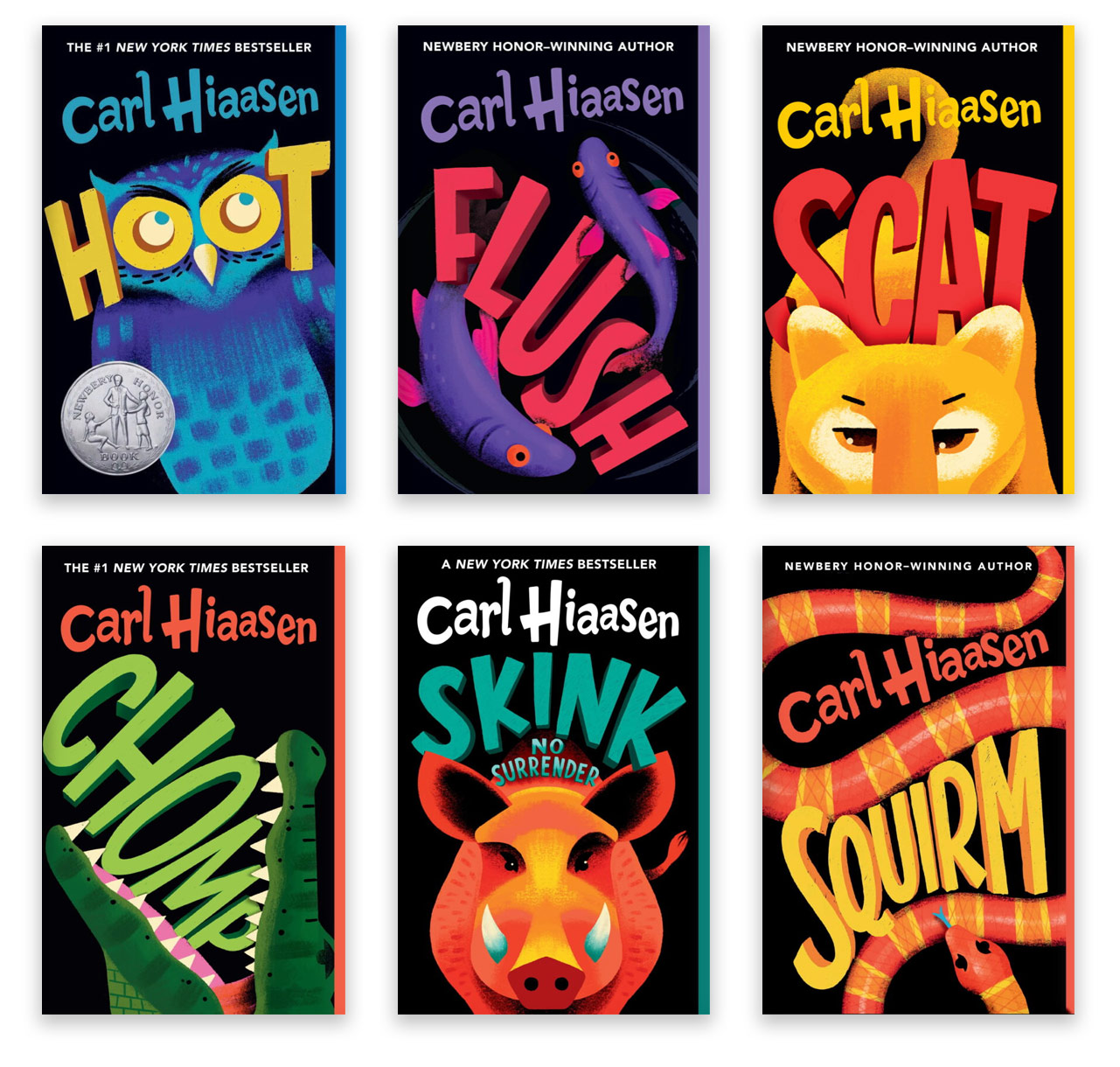
It’s fun to write characters that stand up for what they believe and act on it.”
You’re not afraid to throw your young characters into complex problems and dangerous situations. You’re also, of course, a bestselling writer of novels for adults. How do you change the way you write about tough issues and situations for young readers as opposed to how you tackle them for your adult audience?
I think young readers often have a clearer vision of what’s right and what’s wrong, and the young characters in novels like Wrecker take a more direct approach. Adult characters have a lifetime of personal baggage to sort out. The moral issues in all my novels are consistent; the only difference is that the kids deal with them differently than most of the adults.
I think young readers often have a clearer vision of what’s right and what’s wrong.”
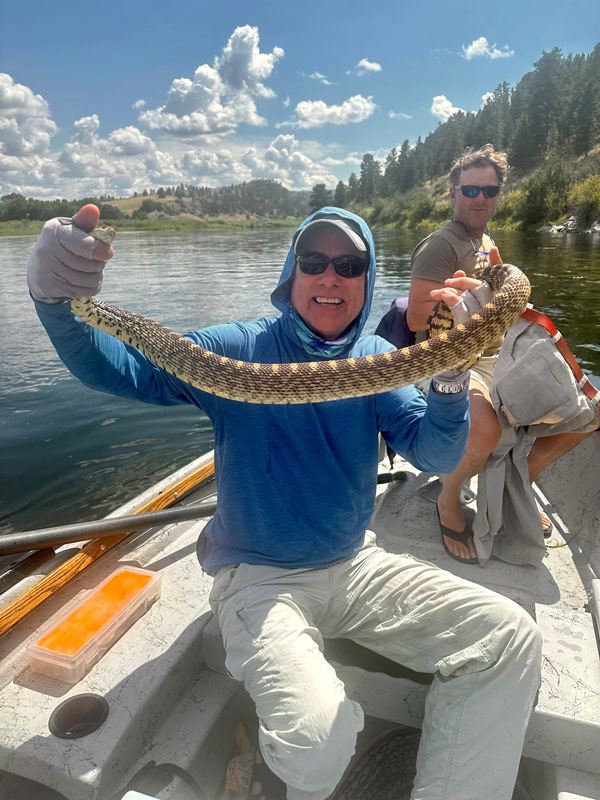
What’s your favorite part about writing for kids? Do you have any favorite anecdotes about the way young readers have responded to your books over the years?
Most writers will tell you that kids are the coolest audience. The letters I receive are sharp, funny, and often very poignant. The other day I heard from a young woman who met me at a book event for Hoot, many years ago, and told me she wanted to be a writer. Today she’s got a book contract with a major publisher. It’s very gratifying to hear stories like that.
Most writers will tell you that kids are the coolest audience. The letters I receive are sharp, funny, and often very poignant.”
Your passion for the natural world comes through yet again in Wrecker—from the way your character finds solace while alone on his boat, to the environmental issues that have provided a foundation for your middle grade books since Hoot. What keeps bringing you back to writing about wild spaces and the risks they face?
Unfortunately, the same challenges that the characters in Hoot tackled still exist in Florida, twenty years later. If anything, the state’s insane population growth, combined with climate change, has put the remaining wild spaces in greater jeopardy than ever. In my world, it’s impossible NOT to write about this stuff because it impacts everyone, young and old, every single day.
Exclusive Excerpt From Wrecker
Here’s an exclusive excerpt from Wrecker for Mackin readers, copyright © Carl Hiaasen, 2023, reprinted by permission of Knopf Books for Young Readers:
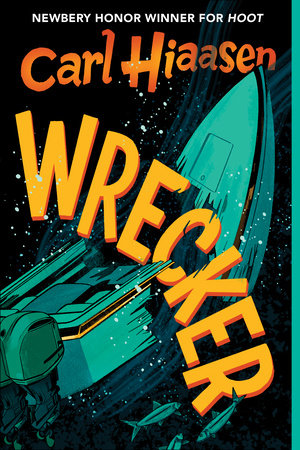
There’s a dive mask and flippers in the skiff, but Wrecker forgot to grab them.
Another brilliant move, he thinks on his way down.
His eyes sting from the salt water and also from the rising plume of gasoline. Even so, the source of the fuel leak isn’t hard to see.
The grape-purple speedboat rests upside down on the bottom, gleaming like a giant dead mackerel. There’s a yawning hole in the bow, where it struck the channel marker. A jittery cloud of green minnows streams in and out through the broken portholes. With so much damage, the go-fast probably sank within minutes of impact. The propellers of its four drowned engines spin slowly in the current, like miniature chrome windmills.
Wrecker has always thought of himself as a good swimmer, but this is much different from snorkeling for lobsters. The speedboat went down in sixteen, maybe eighteen, feet of water—a routine free dive for an earlier, professional edition of Valdez Jones, but Wrecker’s lungs are already aching. The sweep of the tide is stronger than he expected.
Once he reaches the sunken craft, he has only enough time to swim the length of the broken hull before running short of breath. He shoots back to the surface, takes a gulp of air, wipes an arm across his eyes, and thinks:
This is not good.
The anchor didn’t hold. His skiff is drifting away, down-current. Willi appears to be glaring at him from the bow. She throws up both hands as if to say, Are you kidding me?
Wrecker starts kicking hard, trying to chase down the boat. He’s surprised to see Willi move to the stern and vigorously begin yanking the starter cord on the old Evinrude. Minutes later she pulls alongside and helps him aboard.
“Swim much?” she says.
He’s embarrassed to be breathing so heavily. “Where’d you learn to run an outboard?”
“Sea camp for rich kids whose parents ditch ’em every summer.”
“The boat that smashed into that post . . . it sank.”
“What about the people?”
“Dunno. Take me back there,” he says.
“If you’re trying to impress me, this is a major fail.”
“No, it’s for real.”
This time they stow the anchor and tie the skiff to the stumped channel marker. The rainbow slick is dissolving, which means the speedboat’s gas tank is nearly empty.
Now Willi, too, can see the shiny wreck on the bottom. “Oh God. We should call the Coast Guard!”
Wrecker puts on his mask and fins. “Keep a lookout,” he says.
The second dive goes better because the current is slowing. The mask gives him a crystal view, and the flippers add power. He can’t help thinking about his great-great-great-great-grandfather, who had no such advantages when exploring the pitch-black hold of the Isaac Allerton, in waters twice as deep.
The violent gash in the speedboat is wide enough for Wrecker to squeeze inside, fighting his fear of finding a dead body—Silver Mustache, or one of the others. Fortunately, the hull doesn’t hold any bloated horrors. Instead, he ends up nose to nose with a five-foot nurse shark. It’s a harmless, nearsighted creature, but Wrecker still blurts a bubble of surprise. Equally startled, the whiskered forager exits in search of another place to nap.
When Wrecker resurfaces, he’s holding a package the size of a pizza box. It’s wrapped in blue hurricane tarp and sealed with duct tape.
Willi snatches it from his hands and says, “What are you doing?”
“There’s more down there.”
“No, Wreck, let’s get out of here.”
“If you see anybody coming, throw that thing overboard.”
“Is it drugs? It’s gotta be.”
“Maybe not.”
Down he goes again.
Dozens of identical blue packages drift among the loose cushions and life jackets trapped inside the speedboat. Wrecker begins pulling boxes one at a time through the cabin door, releasing them to float toward the surface.
His lungs are burning, but he’s wired. He’s happy. He’s wrecking.
As he kicks upward for another breath of air, he hears metallic knocks coming through the water. It turns out to be Willi, banging Wrecker’s pliers against the skiff’s hull and trying to get his attention.
“Another boat!” she shouts when his head pops up. He yanks off the dive mask and scans the water. What looks like a cabin cruiser is heading their direction, though it’s still pretty far away. There is, however, nowhere to hide on a glass-calm sea.
Willi tugs up her sun mask. “Time to boogie, Wreck.” Four packages are stacked in the center of the skiff.
Wrecker grabs a final loose floater and hands it up to her.
“What’s wrong with you? Do you have, like, a brain bleed?” she says. “We need to dump whatever this is!”
“I got an idea.”
“Stop! No more crazy ideas from you!”
“Untie us from the marker,” Wrecker says, pulling himself aboard. He tugs off his flippers and starts the motor.
Willi presses close to his side as he points the skiff in the opposite direction of Key West, dead-on toward the Gulf of Mexico and the setting sun.
Do you have any tips or tactics to offer young people who want to become writers?
I tell everyone who wants to be a writer to keep a journal, just for themselves. Write something every day, even if it’s just a few paragraphs, and you’ll start to see yourself get better and better. Eventually your confidence will build up enough to help you get started on a book or a poem or a play. The process is different for every writer, but the good ones all have one thing in common: They work their butts off.
Write something every day, even if it’s just a few paragraphs, and you’ll start to see yourself get better and better. … The process is different for every writer, but the good ones all have one thing in common: They work their butts off.”
What are the best ways for educators and young readers to follow you on social media?
I’m on Facebook and Instagram, and I have a webpage, carlhiaasen.com. I don’t have time to respond to everyone, unfortunately, because my writing schedule is ridiculously busy. But I try to look at all the emails and letters.
Is there anything else that you’d like to add?
I just hope people enjoy reading Wrecker. For me, spending so much time in Key West was a blast. Even researching the cemetery scenes was fun—but only in the daylight.






